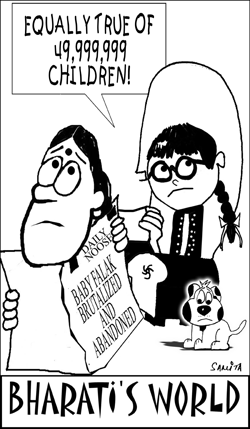In the new academic year starting July 2012, when college and university lecturers and professors saunter into their classrooms to teach, they will need to tread warily. Under a new scheme being drawn up by the West Bengal State Council of Higher Education (WBSCHE), teachers in institutions of higher education will be subject to evaluation by students and institutional managements. “The performance and capability of principals and teachers will be monitored and evaluated. WBSCHE is devising the assessment parameters. Once we frame the guidelines, we will decide how effectively this model can be applied to enhance the standard of teaching and administration in West Bengal’s colleges,” state higher education minister, Bratya Basu, informed media personnel on December 15 on the sidelines of the All Bengal Principals’ Council’s annual conference.
 Sugata Marjit, chairman of the higher education council, is believed to be drawing up a detailed plan. Marjit, who was also present at the conference, elaborated that under the new faculty assessment parameters, “attendance and performance in the classroom, in terms of teaching methodology and quality of lecture,” will be given high weightage. Students’ feedback will also be sought to assess faculty. Marjit also added that WBSCHE is planning to constitute a body — comprising college teachers and government represent-atives — to inspect colleges.
Sugata Marjit, chairman of the higher education council, is believed to be drawing up a detailed plan. Marjit, who was also present at the conference, elaborated that under the new faculty assessment parameters, “attendance and performance in the classroom, in terms of teaching methodology and quality of lecture,” will be given high weightage. Students’ feedback will also be sought to assess faculty. Marjit also added that WBSCHE is planning to constitute a body — comprising college teachers and government represent-atives — to inspect colleges.
On the whole, the newly elected Trinamool Congress government’s faculty assessment and evaluation initiative has been welcomed in West Bengal’s crumbling institutions of higher education ruined by persistent interference and packed by apparat-chiks of the Communist Party of India-Marxist (CPM) during its 34 years of uninterrupted rule in Writer’s Building, Kolkata until last summer.
“This initiative will help teachers get out of the morass of mediocrity and provide much-needed impetus to excellence in higher education. Over the past few decades, all-encompassing mediocrity has seeped into the system. It is time something is done to revive excellence. This will also bring in much- needed accountability among teachers,” says Uma Shankar Pandey, assistant professor at Surendranath College for Women (estd.1948), Kolkata.
However Indrani Raha, associate professor at Kolkata’s Murlidhar Girls College (estb.1919), stresses the need for simplicity and transparency in the faculty assessment process. “The education ministry should ensure that the evaluation process is implemented fairly and transparently. If not, it will provoke teacher unrest and loss of morale within the faculty,” she warns.
Prof. Dilip Sinha, former vice chancellor of Visva Bharati University, Shantiniketan, believes some time and effort must be expended in preparing faculty for assessment and evaluation. “Thus far inclusivity hasn’t been taken seriously while developing undergrad curriculums in particular. Students should be involved in the process of curriculum development and their assessment and evaluation of faculty should be given greatest weightage,” says Sinha.
Repairing the damage that the CPM’s rampaging cadres inflicted for over three decades upon West Bengal’s once proud and respected institutions of higher education is likely to prove a long and painful haul. But making principals and faculty — most of them appointed by the predecessor CPM-led Left Front government — accountable is a great way to start.
Baishali Mukherjee (Kolkata)